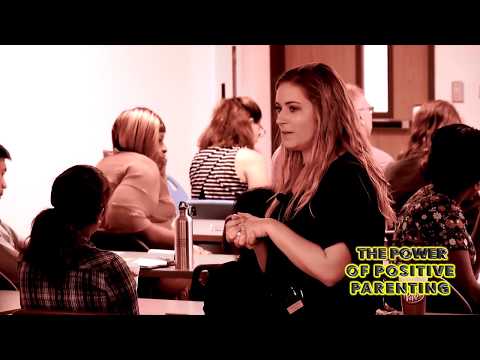
{MUSIC 🎵🎵🎵🎵} I always use the example of kids are so used to hearing don't do that don't text that stop doing that stop hitting your sister whatever it may be but if we focus on what they're doing well they'll be encouraged to continue doing that and you'll start to notice that the negative behaviors might slowly start to diminish so again this isn't a magical seminar that your kids when you go home your kids are gonna be perfect so it it takes a lot of practice and it takes a lot of consistency so we'll talk a lot about the strategies that you can start using but overall if you're consistent with them it can make a huge impact in your child's behavior I'm getting along with others how children can get along with other kids other adults trying to do their best to manage their emotions how to feel good about themselves and then in a safe secure loving and low conflict environment so of course we talked a lot at our agency about the about safety a lot so I might kind of touch on that a little bit more it's just kind of embedded in me to talk about safety and safety with parents so like I talked about parenting can be rewarding enjoyable demanding frustrating exhausting can anybody think of another word that kind of describes being a parent doesn't yell some of them out anyone scary anyone else annoying can be there's no wrong answer overwhelming that's what I kind of talk about all my clients it is overwhelming to be a parent using assertive discipline so assertive instead of aggressive this whole program is really designed to stay away from the hitting and yelling and spanking and more aggressive types of discipline and it's you know what I mentioned focusing on what they're doing well and there's also discipline strategies that can be used having realistic expectations so is it really realistic for my seven-year-old to go to school all day come home do is homework get ready for bed eat dinner and then you know make his bed and clean his room well probably not so maybe those things can wait until you know the next day or making a plan of you clean your room on Tuesdays and Thursdays instead of you know you immediately come come home and you have to do these things so being realistic and then also my favorite one is taking care of yourself as a parent because when you find yourself stressed out and tired and upset you had a bad day it's gonna make it really hard to be patient with your kids and that voice is gonna get raised it's gonna be you know if they do something little it's gonna be like fire under you because you've had a long day and you're you know kind of tired of it so if you have a partner really switching off those roles if you have family members anything that you can take advantage you know that your resources that you can get that break for yourself is so important um so like that preparation I told you for the ground rules so let's say you guys made those ground rules for the grocery store and it was a disaster and so you're in the car on the way home that's when you kind of have that discussion and what I think of discussion it's not supposed to be a lecture and this you know sitting down for an hour and telling you what you did wrong it's basically just getting in the car and saying hey do you remember our three rules I don't think you followed them can you tell me what those Bulls were again okay and then helping them through it if they forgot them and telling them yeah I remember we were gonna go to the park after and now we can't go to the park because you were you know running in the aisles and you were pulling things off the shelves and so we had to leave that's kind of the a minor conversation that you can have instead of you know get in the car slamming everything and driving and all those sorts of things so trying to have a calm conversation and even if that means you need to go home and take a couple of minutes and you need to timeout do that that's fine parents and timeout all the time so really just trying to stick with that giving clear calm instructions so they talk about they start and stop instructions and I'll try to break these down because they can get a little bit confusing the first time you hear them so starting and start instructions is something that you want your kids to do so that would be like cleaning your room pick up your toys go get ready for a school so those can be given twice so you say you use their name especially if you have more than one child you always want to make sure that you're within an arm's length distance because if you're in the kitchen they're upstairs and you just spring time for dinner yeah they're probably just gonna ignore you or maybe they just really didn't hear you and so that's an argument that just can be prevented right there if your whoops there goes again if you're right in front of them so you can say you know Chelsea it's time to get ready for dinner I need you to come to the table and giving them about five seconds to process because you know they need to get that through their head however if they don't do it you're gonna ask them one more time I told you it's time for dinner you need to come to the table they don't do it again right there that's a consequence so putting in that consequence after the second time versus the stop instruction would be four things you want them to stop doing so stop hitting stop running however when you say this stop you need to follow it up with what they should do instead so stop hitting your sister and play nicely I'm stopped running in the hallways and walk and so that's when you want them to stop immediately and you give that one time and after the five seconds if they don't do as you're as they're asked then that's when you give the consequence so they learned that okay when when mom and dad say stop they really mean stop or I'm gonna lose a privilege or whatever the consequence is if you know for the younger ones let's say that they are you know arguing over a video game and so you take it away what the program recommends and it's really beneficial is only away for a set period of time because when you take it away and say this has gone for the whole day or this has gone for the week then that's when you run into the problem of kids are like well just check it away for the week so I'm just gonna keep being bad and I'm gonna keep doing whatever it also you know by the end of the week are you even still remembering that and thinking what the heck that they just do that really made me mad also kids will forget and they'll be like oh I didn't even realize that video game was gone I found a different video game to you know play with so really taking it away for you know little one starting off with I mean the really little ones starting off with like this has gone for 20 minutes give it back after 20 minutes okay you did it again this has gone for an hour give it back okay you did it again time to do a different consequence for the older ones you know saying okay you lost this for an hour giving it back okay you did it again you lost this for an hour and a half so kind of building up the time and that's you don't have to really use that amount of time but instead of doing the very drastic kind of measures so those are kind of the taking away things has anybody ever used quiet time and timeout I had a lot of laughs okay we have 15 minutes so so basically with the quiet time this is something new that I actually learned when I started doing this program two years ago and quiet time is basically like let's say kiddo is playing and he's you know they're arguing with each other and they're arguing over a toy so all you're gonna do is move them a couple feet away from the activity and that way kids can say okay I want to get back to that so I'm gonna behave and so it's quiet time because they're gonna be quiet so of course you talk to this about it talk to them about it before it starts but removing them from it for a set period of time for little ones it's between zero and five minutes and then letting them go back if they are not quiet if they're kickin and screamin and yelling that's when you move to timeout so they kind of do it as taking away the problem activity quiet time in a timeout specific the mother lode so that's like the one for serious misbehavior if you come in and your kid is smack them another kid in the face it's okay to take them directly to timeout on the sheet it has a lot about timeout um so I won't touch too much on this and again please email me if you guys need a copy but basically some of the main things for timeout that a lot of people kind of miss read when they use their own is timeout was supposed to be a designated area so quiet time is just a few feet away timeout is somewhere super uninteresting and boring so if that's a hallway or your little timeout chair in you know a room I will say that on the sheet it does say it's okay to close the door and hold it do not do that I hope yeah do not lock your kid in room or hold it shut I think what it's trying to say is like it's okay you just like barricade them if they are moving around and everything and they're little put them in a playpen or pack and play like some an area or put a baby gate up like somewhere they can't get out but for timeout it would be the time doesn't start until they're quiet so if you tell them go to this corner right here and there's your timeout and they go there and they're kicking and screaming for 30 minutes okay you can throw your fit over there but the second it stops that's when you start the timer and also another thing is when kids are done with their timeout just tell them okay it's over and walk away because sometimes they sit there and they pout and then parents like oh it's okay and kind of running back up to him they just won that battle because you just went up to them and told them how sorry you were creating that safe interesting environment encouraging them to learn using assertive not aggressive discipline having reasonable expectations and also taking care of yourself as a parent hi thank you for arranging this for you know like for the parents and it's really I learned a lot and I'm missing my husband by I'm gonna pass it to my husband and we learned a lot and we applied for our children and thank you girl and iced tea for giving us the opportunity to learn and we raised our good case with this training thanks for everything the you




